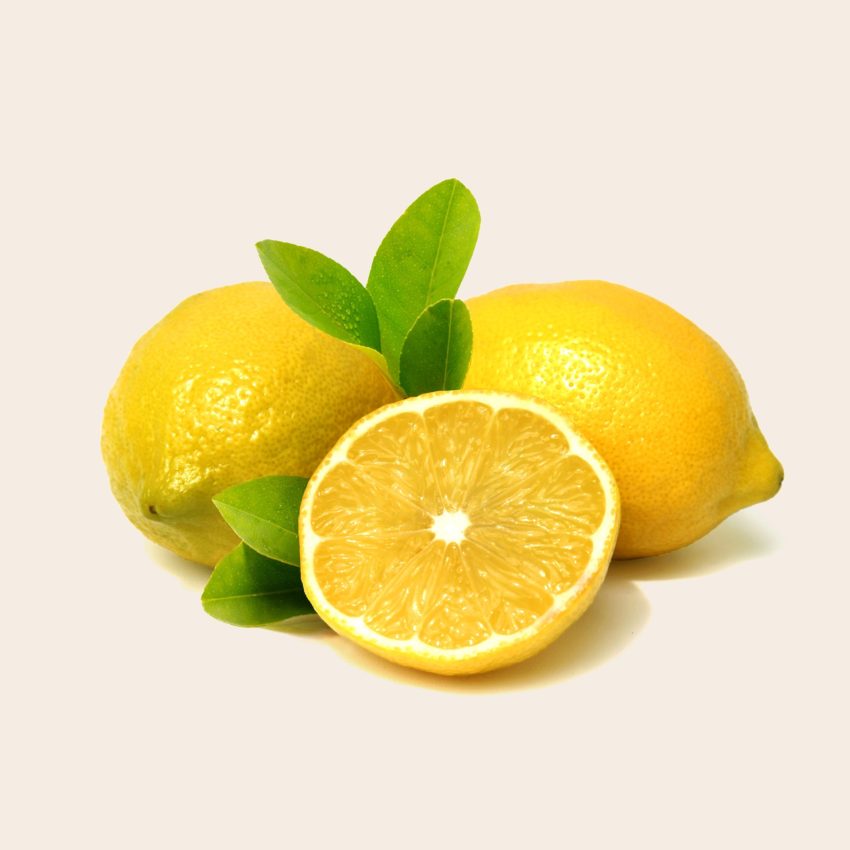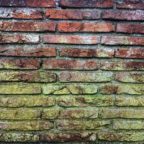Love it or hate it, cleaning has to be done. It seems however that most detergents these days are packed with chemicals and can be expensive to buy. If you’re choosing a more frugal lifestyle or want non-toxic cleaners to use, are there any better-for-you, money-saving ways to get your house spick and span?
Yes!
Look no further than baking soda, lemon, and vinegar!
This fabulous and fresh trio are organic, natural, environmentally friendly and provide fantastic cleaning results.
They don’t smell poisonous and more often than not, they can be found in any pantry or bought for next to nothing in supermarkets wherever you are in the world.
They can be used for a huge range of jobs around the home and here we’ll cover over 20 everyday ways that these cleaners can be applied to make your life easier and money-saving.
Money-Saving Cleaners That Preserve Your Health & Wallet
Bicarbonate Of Soda
Also known as bicarb, sodium bicarbonate or baking soda, this little beauty can shift dirt incredibly well.
It removes stains, eliminates odours, and even makes a natural fire extinguisher as sprinkling it over flames can put out small grease fires!
Lemon
Acidic by nature and fresh to the senses, lemon is also a natural degreaser and anti-bacterial so it cuts through grease and kills germs well.
Lemon oil can help in overcoming allergies, as a furniture polish and when diffused, purifies the air you breathe.
*Lemons and their juice tarnish gold-plated metals so don’t use them on surfaces like taps or plug holes with these finishes.
Vinegar
Vinegar is a miracle product. It is an acidic, fermented liquid used in preserving, cooking and cleaning. It is biodegradable, non-toxic, and a useful disinfectant.
While it can smell strong, if you use the right amount this isn’t much of an issue and its low cost and ton of applications will make using it worthwhile.
*Don’t use acidic products (vinegar or lemon count) on stone surfaces like granite. Instead wipe clean with water then spray over with a mixture of 1/3 cup of 70% rubbing alcohol to 3 cups of water and wipe clean.
Kitchen
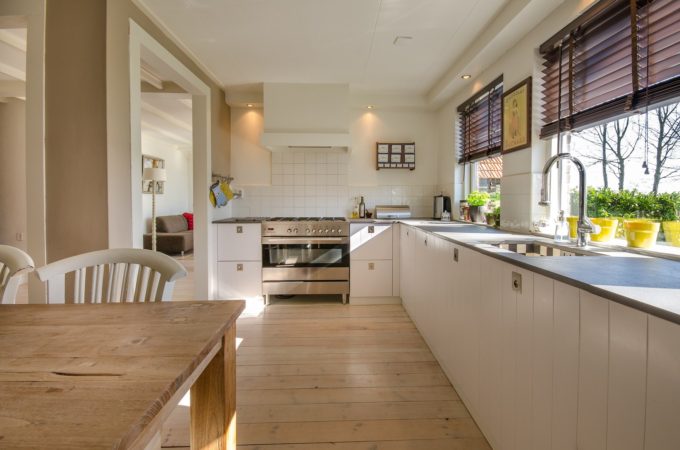
I don’t know about you but I spend a lot of time in the kitchen and wipe things down often throughout the day. It matters to me what cleaning agents get absorbed through my skin and how frequently.
Some kitchen cleaning products, like oven cleaner, seem particularly caustic and I’ve always had an issue with their strong smell.
Thankfully, we have natural alternatives that can get even oven cleaning done.
Also listed are other common kitchen cleaning jobs you’re likely to face as well as how to attack them with baking soda, lemon and vinegar to save yourself and the environment. Win-win!
Stainless or splashbacks – wipe with neat vinegar and rub until marks fade.
Fridge cleaner – mix 3 parts hot water to 1 part vinegar and wipe out the inside and shelves with it.
If your fridge needs deodorising, put a glass of apple cider vinegar in the back of your fridge and it’ll absorb any strong smells within a day or two.
Oven cleaner – scrape out your oven with a plastic scraper or spatula to remove any large, loose bits. Make a thick paste with 1/4 cup of water and 1/2 cup of baking soda.
Spread it over the inside of the oven and door and let it sit for 5 minutes. Then spray all the paste covered surfaces with vinegar.
Let it foam and work for 5 more minutes. Then wipe away the grime and paste with hot soapy water, scrubbing where needed.
Clean chopping boards – remove smells, stains, and battle germs by rubbing half a lemon over your chopping board surfaces. Leave for 10 minutes then rinse off.
Microwave cleaner – squeeze a lemon (few tbsps) into a mug, top up with water to almost full then put in your dirty microwave until boiling.
Leave to sit in there for a further 10 minutes and then any marks, stains, and smells wipe away with ease.
Floor cleaner – combine 1 cup of vinegar with 3 cups of warm water and mop onto non-waxed floors. Stains dissolve and it leaves a lovely lustre that salutes your effort. Adding a few drops of essential oil to your bucket will make it smell amazing too.
Sparkly dishes – add two cups of vinegar to your dishwasher with the soap and on to shiny new dishes you go.
Coffee pot & machine cleaner – add 1 cup of ice, 2 tbsp coarse/kosher salt and 1 tbsp white vinegar to your room temperature coffee pot. Swish it around for several minutes to clean and remove stains. Wipe the outside of the pot with vinegar.
If you want to clean the inside parts of the machine too, run white vinegar through a cycle (use a filter) then run water through for two cycles. Do this monthly and you should have less overall cleaning on your hands and better-flavoured coffee.
Bathroom
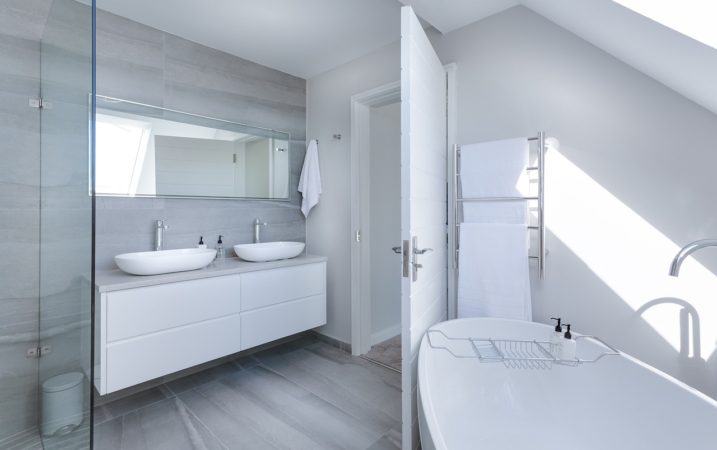
Soap-scum, limescale, smells make bathroom cleaning a tough job at times but with this clean green trio you’ll have it shiny and fragrant in no time.
Check out how to use bicarb, lemon or vinegar on each of the cleaning jobs below.
Shower screen cleaner – work a half-cut lemon into the marks on your shower screens to get hard water stains and limescale off. To prevent soap scum returning, squeegee, or dry the shower after each use.
Showerhead cleaner – if your showerhead is getting limescaly, wrap a vinegar-soaked cloth around it and leave for a few hours – it’ll break down the buildup.
Grout cleaner – Spray your grout with vinegar and wait for 5 minutes. Then scrub with a heavy-duty nylon brush and rinse off.
Another grout cleaning solution is to pour hydrogen peroxide on the grout followed by a generous sprinkle of bicarb over it. Let it sit for 15 minutes or so then scrub with a nylon brush and rinse off.
Toilet cleaner – sprinkle 1/4 cup of baking soda into your toilet bowl. Follow that with 3/4 cup of white vinegar and leave for a few hours.
It’ll help remove that brown limescale build-up. If you can’t leave it for that long, wait 5 minutes then scrub the bowl with a toilet brush then flush.
Basin, bath and shower tray cleaner – sprinkle baking soda around then wipe around with a cloth.
Tap cleaner – make a thick baking soda paste with water around then rub on any limescale marks with a soft cloth to remove them. Lemon juice makes chrome shine and removes marks well too.
Mirror cleaner – mix 1 cup water and 1/2 cup vinegar and spray on to your mirror starting at the top. Wipe from side to side with a soft microfibre cloth or an old newspaper page scrunched up.
Bedroom

Wall cleaner – give marks the boot with this vinegar combo. Mix a cup of vinegar, 1 tbsp of baking soda, and 2 cups of warm water. This eco-blend should do the trick.
If you’ve got scuff marks on wood like skirtings, try rubbing them with equal parts vinegar and olive oil.
To remove crayon and pencils marks from walls, rub them until they disappear with a few drops of lemon essential oil on a soft cloth.
Window cleaner – add a few tbsps of lemon juice to a spray bottle and top up with water.
Alternatively, use 1:1 water and vinegar and a soft, dry cloth for streak-free glass. Vinegar works well but lemon smells better I think.
Carpet cleaner – sprinkle baking soda over carpets, leave overnight and vacuum up. Don’t add it if the carpet’s too wet as it turns to a paste and gets messier than expected.
If you’ve got a carpet stain, mix 1 tsp dishwashing liquid with 1 tsp of white vinegar. Add two cups of warm water and clean the stain with it.
Other
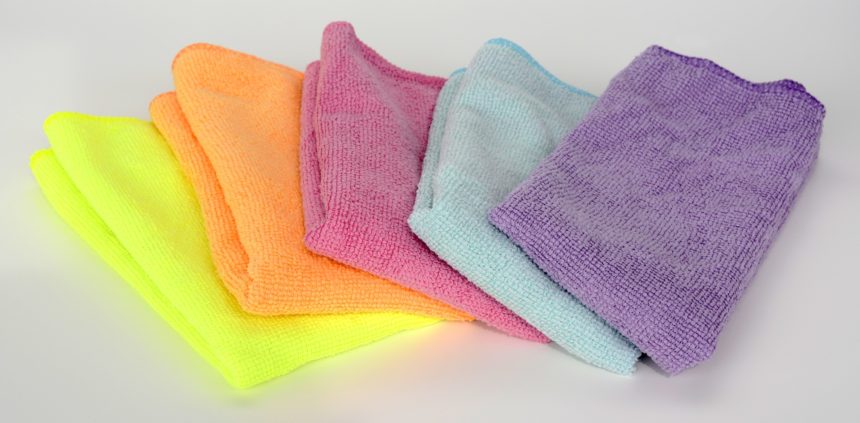
Sticky label residue cleaner – to get rid of annoying sticky residue after removing labels, rub it over with a few drops of lemon essential oil to work it in then wipe clean with warm water.
Laundry – add some baking soda to your washing machine and it’ll freshen up your laundry. If you have grease stains on clothing, rub it with a cut lemon and wash as normal.
As a bleach alternative, mix 1/2 cup of lemon juice with 4L of hot water and soak your whites in it for an hour or more. Wash as usual and hang in sun to dry and whiten.
Teeth whitener – add some baking soda to your toothbrush and it’ll help remove stains from your teeth. Toothpastes are also available with baking soda as an ingredient to do this.
Mouth ulcers – for instant, though temporary relief, dab some baking soda on to your ulcer or make a paste from it with water and put that on. Doesn’t taste great but does the trick.
Pet deodoriser – got wet dog smell on your hands? Sprinkle their fur with baking soda and brush out after a few minutes or when they’re dry. It’s an awesome non-toxic solution to pet pong but not the best taste if licked!
Ant control – make an ant trap by putting 1 tbsp of sugar and 1 tbsp baking soda in a lid and placing where ants are. The sugar attracts them and the baking soda kills them.
If you have anthills, pour a kettle of boiling water down it, wait 5 minutes and repeat if necessary.
If you’re battling to keep ants out of your home, sprinkle diatomaceous earth around the base of your house. This perimeter creates an ant killing barrier.
Drain cleaner – pour 1/2 cup of baking soda down your drain. Follow it straight away with 1 cup of vinegar. Let it sit for 20 or so minutes and the foaming action will help unblock drains.
*Don’t do this if you’ve recently used commercial drain cleaners as the baking soda and vinegar could react with those ingredients and cause dangerous fumes.
Just want a great smelling sink? Pour a cup of vinegar down it and wait 30 minutes before rinsing.
Electronics cleaner – want to clean your phone, TV, tablets or computer screens safely? Turn them off and allow the screens to cool.
Then spray a little distilled water onto a soft, dry cloth so it’s just damp and gently clean your screen using little circular motions. Reapply this solution for tough stains or marks.
Once the screen is clean and dry you can switch it on again.
Books About Money-saving Natural Cleaning Solutions
This book by Diane & Jon Sutherland is not a lemon! Sorry, I couldn’t resist.
Seriously though, this book is full of practical household tips for how to use lemons in your home.
From cleaning to gardening, beauty, health, cooking and beyond, it’s packed full of tips for every household, and the lemon-inspired recipes included are delicious.
Halle Cottis is a life coach and founder of Whole Lifestyle Nutrition. In her book ‘Natural Solutions for Cleaning & Wellness’, she details health remedies and green cleaning solutions (without chemicals and toxins) for your home and family.
As well as myriad cleaning ideas, she covers pest control, outdoor uses, health solutions for skin, aches, pains and infections, digestion, and emotional support for things like PMS, cramps, anxiety, and depression.
In this ultimate guide she goes beyond baking soda, vinegar and lemons so, if you’re serious about healthier living, get hold of this book.
It’ll help you reduce the amount of harsh and toxic cleaners and medicines in your home and you’ll be saving both time and money with her 140 natural solutions.
What are your favourite uses for baking soda, vinegar and lemons? Or do you have any recommendations for other money-saving, natural cleaning products?
I’d love to hear from you so leave a comment.
Please also share this post by pinning an image below.
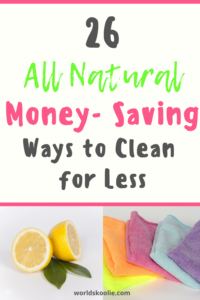
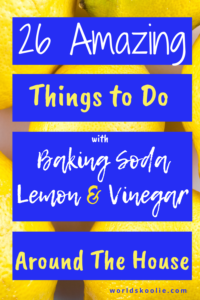
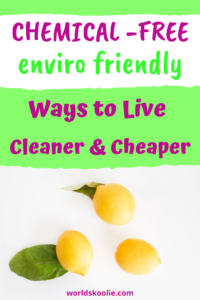
Thanks!

Meagan

